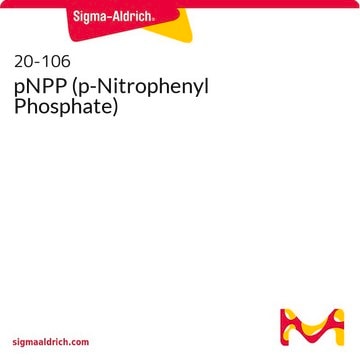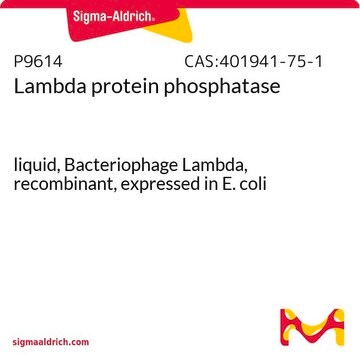Fontos dokumentumok
P6244
Protein Tyrosine Phosphatase 1B human
recombinant, expressed in E. coli
Szinonimák:
PTP-1B
About This Item
Javasolt termékek
rekombináns
expressed in E. coli
Minőségi szint
form
solution
specifikus aktivitás
≥20 units/mg protein
molekulatömeg
37.4 kDa
koncentráció
≥0.5 mg/mL
UniProt elérési szám
vonatkozó betegség(ek)
diabetes; obesity; cancer
kiszállítva
dry ice
tárolási hőmérséklet
−70°C
Géninformáció
human ... PTPN1(5770)
Looking for similar products? Látogasson el ide Útmutató a termékösszehasonlításhoz
Általános leírás
Alkalmazás
Biokémiai/fiziológiai hatások
Egység definíció
Fizikai forma
Tárolási osztály kódja
12 - Non Combustible Liquids
WGK
WGK 1
Lobbanási pont (F)
Not applicable
Lobbanási pont (C)
Not applicable
Analitikai tanúsítványok (COA)
Analitikai tanúsítványok (COA) keresése a termék sarzs-/tételszámának megadásával. A sarzs- és tételszámok a termék címkéjén találhatók, a „Lot” vagy „Batch” szavak után.
Már rendelkezik ezzel a termékkel?
Az Ön által nemrégiben megvásárolt termékekre vonatkozó dokumentumokat a Dokumentumtárban találja.
Az ügyfelek ezeket is megtekintették
Tudóscsoportunk valamennyi kutatási területen rendelkezik tapasztalattal, beleértve az élettudományt, az anyagtudományt, a kémiai szintézist, a kromatográfiát, az analitikát és még sok más területet.
Lépjen kapcsolatba a szaktanácsadással












